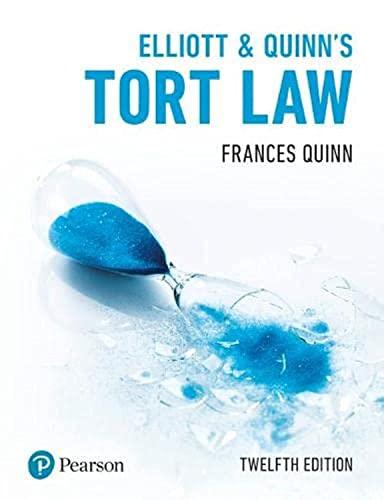Question
1. The concept of vicarious liability developed in the business world, where the company is out to make a profit and its activities are for
1. The concept of vicarious liability developed in the business world, where the company is out to make a profit and its activities are for the most part directed to generating profit. Is it appropriate to apply a test developed in this context to a charitable organization? What are the pros and cons for holding organizations liable for the conduct of their employees?
2. Does the idea of contributory negligence reflect the major aims and purposes of tort law? Does it make sense to reduce the amount of damages available to a plaintiff, when he may not have suffered the loss to the same extent, or at all, but for the negligence of someone else?
3. Louise arrived for a two-week vacation at a Mexican resort. She spent the day at the beach and, on returning to her room, found a bottle in the fridge containing a clear liquid. Louise assumed the liquid was water and started to drink from the bottle. It turns out that a member of the cleaning staff had inadvertently left a bottle of caustic cleaning solution in the fridge in Louise's room and this is what Louise had drunk. Louise suffered extensive injury and required emergency surgery to remove some of her esophagus. Louise wants to sue the cleaning staff member who had left cleaning solution in Louise's fridge. Will this action be successful? Does the cleaning staff member have any defences?
4. Without permission, Angela borrows Jacob's car. Has Angela committed a crime? Do you think that her conduct might be tortious as well?
Step by Step Solution
There are 3 Steps involved in it
Step: 1

Get Instant Access to Expert-Tailored Solutions
See step-by-step solutions with expert insights and AI powered tools for academic success
Step: 2

Step: 3

Ace Your Homework with AI
Get the answers you need in no time with our AI-driven, step-by-step assistance
Get Started


